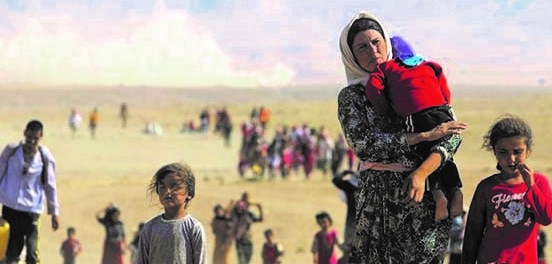Climate, Health and Equity Brief
Refugees, rising costs and declining mental health
May 28, 2021

The Climate, Health & Equity Brief is GMMB’s take on the week’s news on the current impacts of climate change. If you haven’t subscribed yet, you can do so by clicking here.
Hot Topic: Rising costs. As the planet continues to warm, the costs of extreme weather and the impacts of climate change on human health are accelerating at an alarming pace. In 2020, 30.7 million people were displaced within their countries by climate-fueled extreme weather events. Climate refugees accounted for 75 percent of these migrations in 2020, displacing three times more people than conflict and violence. In addition to tens of millions of people seeing their homes and communities destroyed and being forced to rely on aid, temporary shelter and sheer resilience to survive, the migration is estimated to have cost economies approximately $20.5 billion in 2020 alone.
And climate-related health costs are just as mind-boggling. Two new studies out this week find that climate change and its impacts are causing notable increases in depression, anxiety, suicide and even stillbirths. Beyond these tragic outcomes, current estimates put the hard medical costs of climate change in the U.S. alone at $820 billion per year.
Here in the U.S., these impacts can increasingly be felt in national and state budgets. President Biden announced this week that he will double FEMA mitigation funding to $1 billion, earmarking funds to support states, territories, tribes and rural communities’ efforts to prepare for hurricanes, flooding, winter storms, extreme heat and wildfires.
In California, which is already in the midst of extreme drought and has been plagued by increasingly frequent, intense and deadly wildfires over the past several years, Governor Gavin Newsom asked state lawmakers to approve $1.2 billion to improve wildfire resilience. This would be a 16-fold increase over what the state budgeted for wildfire resilience last year, and more than double the funding currently set aside by California lawmakers.
— Matt & Traci, GMMB
Human Health
According to a new report, nearly 31 million people worldwide were forced to migrate in 2020 due to climate change and extreme weather—more than triple the number of people displaced due to conflict and violence. (Aljazeera)
A new study analyzing birth outcomes across 12 countries revealed that 17 to 19 percent of stillbirths can be traced to chronic extreme heat exposure among pregnant women. (Science Daily)
A new report highlights the numerous, worsening mental health impacts of climate change—including depression, anxiety and increased rates of suicide—and issued a call for climate action to improve mental health. (The Guardian)
A new report shows that the health costs of climate change in the U.S. exceed $820 billion per year, which includes $16 billion to treat the health effects of wildfire smoke and $7.9 billion to treat the health effects of smog. (Grist)
A recent report found that Olympic athletes could face serious climate-related health risks—including cognitive impairment and heat exhaustion—during this summer’s Olympic games in Tokyo, where annual average temperatures are increasing more than three times faster than the rest of the world. (CNN)
Planetary Health
Despite a 2014 pledge to cut deforestation in half by 2020 signed by 100 countries and major corporations, a new report found that there has actually been a 50 percent increase in agricultural deforestation globally in the past seven years. (InsideClimate News)
“The costs of inaction far outweigh the costs of action.”
– David Miliband, Secretary of State for the Environment
Equity
A new study in the journal Nature revealed that due to a history of redlining and discriminatory access to green spaces, Black residents in 169 of America’s largest urban areas bear a disproportionate burden of heat stress compared to white residents. (BBC)
Politics & Economy
Despite two thirds of Americans believing that climate change poses an urgent threat, only one third support completely phasing out fossil fuels, according to a new survey conducted by the Pew Research Center. (The Verge)
President Biden announced that the government will double funding for FEMA’s Building Resilient Infrastructure and Communities program—which helps communities prepare for natural disasters—to one billion dollars, as climate change exacerbates extreme weather events and their financial impact. (ABC News)
This year, California will increase wildfire prevention spending 16-fold to $1.2 billion in preparation for a severely destructive wildfire season, much of which will go to thinning overly dense forests, as climate change greatly exacerbates wildfires in the state. (Grist)
A new study found that the percentage of clean energy jobs in the UK’s offshore energy industry—already the largest in the world—will increase from 20 to 65 percent of offshore energy jobs by 2030. (The Guardian)
Action
Auto giant Ford Motors announced plans to increase its spending on electric vehicles to more than $30 billion and make 40 percent of its volume all-electric by 2030. (CNBC)
Exxon and Chevron shareholders moved against company management by voting two activist investors who favor renewable energy onto the Exxon board and voting to force Chevron to cut emissions that come from burning Chevron products. (Earther Gizmodo)
Denver plans to construct a billion-dollar art and culture site that will be entirely powered by heat-recovered energy from sewers, which will save the city a carbon equivalent of driving an average gas car around the equator 250 times. (NPR)
Kicker
Curious about just how hot the U.S. will get due to climate change? Check out this interactive map to see how your state is projected to fare.






